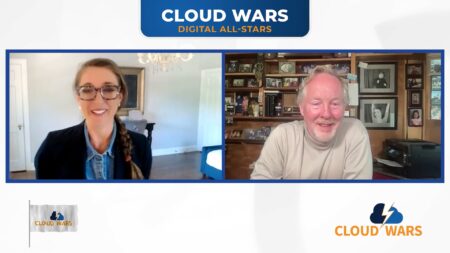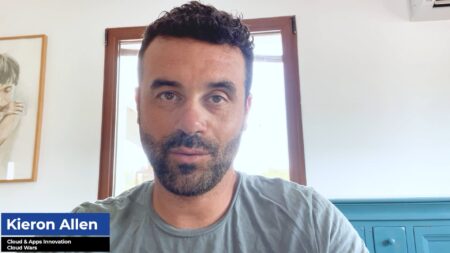After the market cap of Salesforce experienced a single-day surge of $50 billion after it announced blowout financial results despite the global pandemic, the most obvious question is this: how in the world did they do that?
To offer some perspective, that $50 billion jump—generated in a single day—is bigger than the entire market cap of some corporate giants you probably know well: General Motors, eBay, DuPont, MetLife, Biogen, Kraft Heinz, Charles Schwab, and ConocoPhillips among many others.
How did Marc Benioff do that?
Here at Cloud Wars, we’ve been bullish on Salesforce ever since we launched the site, with Benioff’s company having held the #3 spot on the Cloud Wars Top 10 for the past 2 years. But this latest achievement—and while it was reflected in quarterly results, there is nothing short-term about it—dispels any doubts anyone might have about Salesforce being one of the world’s most-influential tech companies.
Again, how did Marc Benioff achieve this?
And how did he do it in the midst of a pandemic?
In a massive gift to the business world, Benioff answered that question with great clarity and conviction during Salesforce’s Aug. 25 earnings call that he turned into a global forum on digital strategy, leadership, courage, and customer-centric vision.
Over the past 15 years—and I realize this admission may be an indictment of my personality and habits—I’ve listened to or read transcripts from thousands of quarterly earnings calls. All are informative, most are predictable, many are boring, and a few stand out as truly powerful, transformative, and vital.
Salesforce’s Aug. 25 strategy session masquerading as an earnings call was, to me, the most compelling and insightful such event that I’ve ever heard. By a long shot.
Every businessperson with even a passing interest in strategy, leadership, vision, the power of will, and the belief in core values should listen to it—probably more than once.
And because I love you all so much, I’ve pulled out 10 excerpts from that call that capture Benioff’s unique brilliance and passion on topics that are essential for every executive in every company across every industry. I hope you enjoy these 10 highlights from Marc Benioff, and that you challenge yourself to build on and transcend them. (I’ve highlighted some key points and comments throughout.)
1. Are you going to change, or bury your head under the pillow?
“We started this quarter with 54,000 remote employees working at home. We knew that we had to make a number of changes. We knew that it was going to be critical for us to reshape our company, that this was a moment in time that you basically had to make a decision: Are you going to keep things the way they were? Or are you going to change? Or are you going to shift? And we made a decision that we were going to change, and we were going to shift. We shifted our operational values very aggressively. And as we changed those operational values, we started to see momentum build. We called that out on the beginning of the call after Q1, where we saw pipeline starting to increase for the second quarter and the third quarter.
“And it really was that as we piled in and doubled down on these core operational values, we got much closer to our customers. We understood that if we were going to succeed at a moment like this, we are going to have to be closer to our customer than ever before, that we’re going to have to change a lot of aspects of the company. And as we made those adjustments, we saw the speed increase right up to the end of the quarter. And that was just really powerful.”
2. Don’t just reimagine your business—reimagine your relevance.
“So we’ve made changes at Salesforce that we now are advising our clients to make on how to get their employees to participate. We have 54,000 employees. For us to achieve these results, everybody has to be on the field and playing the game. We have to also give them the incentive to play, to train them, to keep them motivated. Every week since the pandemic has started, we’ve had an all-hands call where we have all 54,000 people on a telephone call or Zoom, and we’re talking to them around the world and giving them a play-by-play for the week. That hasn’t happened since we were a 10-person company, or a 100-person company. That’s what little start-ups do—that’s not what companies who are entering the Dow will do!
“This is like, whoa! This is like a moment! So we’re reimagining our business. And we’ve also had to reimagine our relevance.”
President and chief product officer Bret Taylor later expanded on Benioff’s point: “We really feel like we’ve demonstrated over this past quarter our ability to reimagine the way we engage with our customers in completely new ways. I think Marc had made a comment in the last earnings call that stuck with me, where he said, on one hand, we’re all staring at these screens and it feels so impersonal. On the other hand, I’m staring into all of my colleagues’ and customers’ living rooms, and it’s oddly more personal at the same time.
“So broadly, what I’d say is our ambition to transform our customers with the success of our technologies, our customer success team, and our distribution teams has not changed. And in fact, I think there’s a broader imperative for digital transformation than there ever has been. What has changed is how we engage with our customers—that has completely transformed. As a company, we developed over the past quarter that mindset of constantly transforming and reshaping ourselves to be able to meet our customers where they need to be met.”
3. “We’re not the same as we were before.”
“We’re not a subscale organization. We are a scaled enterprise software company. We are able to compete effectively, as evidenced by these numbers, with any enterprise software company that’s on the field today, and we’re able to manage our distribution organization and go to market in ways that have a level of acuity that we did not have before.
“I mean, it’s powerful. When you add it all up, participation and enablement and relevance and the tactical plays and then the values that we apply, our core values, well, we’re a different company. This has changed us. The pandemic has changed us. We’re not the same that we were. These aren’t even the same players on the call that we’re talking to you at the beginning of all of this. So that’s really amazing. And I think that these results are evidence of that.”
4. The incredible importance of speed.
Benioff cited 3 customers—AT&T, Banco Bradesco, and Under Armour—as examples of how the customers’ urgent need to change rapidly triggered a parallel imperative within Salesforce. And throughout the call, he kept coming back to the need for speed. ““The thing that’s interesting about AT&T is that they have a huge vision where every single customer touch point, whether it’s their stores, whether it’s their e-commerce, their app, whether it’s getting a message from them, they want to know you as a customer. They want to have a single source of truth.
And that’s the deal that we’ve signed, obviously, in February. And I was thrilled that this quarter, we’ve deployed now hundreds of stores and the first 35,000 users. And so I’ll tell you, at this moment in time, there’s never been a time when we’ve had to go faster. We’ve had to deliver customer success faster, and we’ve had to be there for our customers…. We look internationally at tremendous victories like Banco Bradesco. Just had a great conversation with their CEO, Octavio de Lazari.
Tremendous vision for the future of financial services and how customers are the most important things today to make things go faster for their bank…. I also was especially impressed with how Under Armour flipped on our Commerce Cloud and flipped off the old technology this quarter. That was really powerful. I mean, we have to act with a level of speed and capability with our customers that we’ve never had to draw on before.”
5. As the future arrives more rapidly, relentless relevance is essential.
“I guess this is the third major crisis or maybe fourth that I’ve been through as the CEO of Salesforce. And in each crisis, things are different. But one thing that isn’t different is each one has been an accelerator in the future, that each crisis tends to bring us to the future faster. And that appears to be what’s happening here. Look, I’m speaking to you from my home. Each of my executives are in their home. I’m looking to the screen that looks like the Brady Bunch with little video images of all of them, Gavin in London and Amy in San Francisco and so forth. And it’s quite complicated that we see this continual advancement and acceleration.”
Here Benioff went back to one of the Big Questions cited at the top of his remarks: “But you have to, as a CEO, take a moment and ask yourself, how are you going to change?” Later, Salesforce president and chief revenue officer expanded on the existential need to remain relevant: “Once the first couple of weeks of the pandemic had passed, we saw companies begin to realize that digital transformation was an imperative that they just couldn’t afford to put off any longer.
“So I think what we saw with our sales leaders and with the products that Bret and the team put together for us was that we were relevant. That was the key word, I would say, and we were able to pivot very quickly with very agile performance from the company. And we were there to help our customers through these difficult periods, where they had to make decisions that would typically take weeks and months, sometimes in days.”
6. Business as a platform for change.
“And for us, this moment is actually quite humbling, quite bittersweet. It reminds us that, at Salesforce, business is the greatest platform for change, that we’re really here to be a great example of stakeholder capitalism, to really show how we’re able to deliver a phenomenal return for our shareholders, as well as for our stakeholders. And in many ways, this quarter really is a victory for stakeholder capitalism. It’s been not only about our core products but also about our core values…. It’s about showing how our Customer 360 has been a platform for change for so many of our customers.”
7. Customer 360: MuleSoft has become the “anchor tenant”
From president Bret Taylor: “And one of the effects that had in this quarter is our attrition rate was better than we had expected. And that’s in part because we’re becoming more mission-critical with MuleSoft with the integration of 360 products…. Our customers are coming to us to build the Customer 360, that single source of truth for their customers. So that in the face of unprecedented change for their customers, they can transform their business. They can go digital.
They can integrate sales and service. It’s really that single source of truth, and it’s the anchor tenant of the Customer 360.”
8. Tableau’s data-analytics capabilities have transformed Salesforce
“We were so fortunate to be able to acquire Tableau last year. It is one of the world’s leading enterprise software companies, probably one of the most-loved brands. The ability to see and understand data, the ability to build these compelling visualizations like you see in the public domain like at public.tableau.com. But I think the part that you don’t really know are that when we talk to so many companies, they’ve gone wall to wall with Tableau. And doing those types of deals, that’s very exciting because Tableau is analytics for the rest of us…. These two companies [Tableau and MuleSoft] together, this is a huge accelerator for our business.”
9. Is a relatively narrow product focus good or bad in the enterprise-software business?
“A lot of our competitors are everywhere. They’re in every market. Some of them are in enterprise and consumer. They’re not just in CRM, they’re also in HCM. They’re in ERP. They’re public cloud. I mean, we’re not—we’re singularly focused.”
10. Beyond “business value” to “company values.”
“So this is really a moment where I say values bring value. This is about us really paying attention, as I said, to our core products and our core values. And that’s really the accelerator.”
RECOMMENDED READING
How Salesforce Plans to Beat Oracle and SAP While Scaling to $35 Billion
Marc Benioff: The Extraordinary Ascendancy of a Global Leader
Best Software Acquisition of All Time Was Salesforce Buying Tableau: Marc Benioff
As Salesforce Blows By SAP and Oracle, Cloud Wars Top 10 Market Cap Hits $5.66 Trillion
Salesforce Beats SAP, Oracle, Microsoft, Adobe—Combined!—in 2019 CRM Share
Cloud Wars: Why Microsoft Is #1, Amazon #2, Salesforce #3, Google #4
Salesforce Shocker: Its #1 Revenue Business Is “Platform and Other”
Marc Benioff Delivers: “The Best I’ve Ever Seen Salesforce Perform”
Workday Says Limitations of Legacy Systems (SAP & Oracle) Boosted Q2 Growth
Subscribe to the Cloud Wars Newsletter for in-depth analysis of the major cloud vendors from the perspective of business customers. It’s free, it’s exclusive and it’s great!








